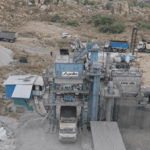We are not only adapting but innovating more than ever, says Sridhar Balakrishnan, MD & CEO, ACC Limited
The Pandemic has further expedited technological advancement such as minimum human intervention by integrating IoT, AI. Towards this, what are the R&Ds going on at your end?
For over 80 years, ACC has been synonymous with cement, establishing its reputation as a pioneer organisation that consistently sets new benchmarks in research and innovative product development. ACC is the only cement producer in India with its own in-house research and development facility which is recognised by the Department of Scientific & Industrial Research (DSIR) in research and development activities related to cement and concrete areas. The way business environment is changing, organisations which embrace technology and remain focused on digital innovation, intelligent use of data and excellence in customer services would be able to lead the way. Over the last few years, we have increasingly focused on transforming our business by leveraging IT and digital interventions. We are enhancing customer experience through upgraded versions of Dealer Connect App. This offers additional functionalities. The Concrete Club App comes with a singular social platform for construction professionals such as architects and engineers.
During the Pandemic we launched innovative products to keep our commitment on build a sustainable living for the future. With the ability to predict market requirements and identify consumer preferences we launched products backed by extensive research. Our aim is to provide customers solutions that not only enhance durability but are environment friendly. The expansion of our portfolio with the launch of ECOPact, ACC Thermofillcrete, ACC Suraksha NX Antiwashout Concrete, and ACC ADMIX will unveil possibilities for new-age construction. By developing these cutting-edge building solutions, we aim to drive efficiency and deliver better value for commercial as well as individual customers. In line with sustainability priorities, ECOPact, a ready mix green concrete for high-performing, sustainable and circular construction was also launched. This is the first green concrete range launched in India and was brought from the parent LafargeHolcim. The aim is to give eco-conscious customers a choice to significantly reduce the carbon footprint of buildings. The innovative manufacturing process reduces CO2 emissions by up to 100%.
How are you adapting to the ‘New Normal’?
Although the disruption caused by Covid-19 created many challenges for organizations across the board, but we were quick to adapt to the new normal. We promptly setup the Business Resilience Team (BRT) that took proactive steps in guarding the safety of our employees, business partners and communities. Since the outbreak of this pandemic our core focus remained on ‘Health, Cost and Cash’. Our operations continued to pave the way for business continuity and resilience as we drove cost efficiencies and prudently optimised cash flows to conserve liquidity.
We are not only adapting but innovating more than ever and investing in our people, technology and operations to develop solutions that take advantage of emerging trends in the industry. We continue to invest in areas of solutions and products, digital initiatives, technology, sustainability and in people development to build the ACC of tomorrow. As we look forward to recovery of the nation, we must always prioritise health and safety and commit ourselves to supporting one another. I am optimistic about the work that we all are doing and the processes that we have put in place for sustainable value creation.
The ongoing Pandemic has badly battered the economy. Does infrastructure hold the key to revive the Indian economy? Your views
The resurgence of Covid-19 cases, as infamously called ‘the second wave’ could not have hit India at a worse time. It has disrupted business plans of corporates, increased uncertainty and crippled operations. All of these factors have aggravated the problems for India’s working class, especially low-income earners and migrant labourers. This unprecedented crisis has presented us with an opportunity to revisit how we conceive, design, regulate, build and operate physical infrastructure in our country. Investment in infrastructure could prove to be an important step towards reviving the economy. National Infrastructure Pipeline (NIP), a government led initiative aims to build on India’s Vision of becoming a USD 5 trillion economy by 2025. The NIP can provide a sound blueprint along with post Covid re-prioritization of resources and strong implementation, building future-ready infrastructure holds the key to reviving the economy and getting back on the growth agenda.
How do you see the economy, opportunities and challenges in this pandemic situation and please give us a brief idea about the strategies outlined to tap in the future potentials?
The pandemic created short-term challenges and medium term opportunities. Though our focus remained on “Health, Cost and Cash”, we are innovating more than ever and investing in our people, technology and operations to develop solutions that take advantage of emerging trends in the industry. We continue to invest in areas of solutions and products, digital initiatives, technology, sustainability and in people development to build the ACC of tomorrow. The long-term success of our business is rooted in our ability to keep sustainability at the core of our endeavours. Our unwavering commitment towards balancing business growth, environmental stewardship and social progress bears testimony to our concerted and responsible efforts towards transitioning to a brighter future.
We will continue to draw strength from our strong relationship with customers and business partner. However, we will continue to draw strength from our strong relationship with our customers and business partners, as well as our robust and resilient business model and our strong financials. As a strong player, we are well positioned to take advantage of the industry upcycle and contribute to nation-building. As we look forward to a year of recovery, let us continue to prioritise health and safety and commit ourselves to supporting one another.
What are your views on the need to adapt and remould the infra activities as per the New Normal to spur the economy?
The new normal has two aspects. First, there is an ascent in the digitalization in organizations across all businesses. The reality of getting utilization from AI to make supply chains more resilient cannot be ignored. Utilizing this kind of information to drive operational dexterity has become the need of the hour. Inside the impending not many years, the organizations will undoubtedly put resources into Artificial Intelligence & Machine Learning to guarantee improvement of assets and drive cost efficiencies. This also drives the second aspect of the new normal. To contain the effect of this pandemic as much as possible on our employees must work remotely thereby focusing on themselves & their family’s safety. Steps towards absolute digitalization of the value chain will lead to minimal human interaction as far as possible which will be a significant step towards employee safety thereby meeting organizational objectives. Over the last few years, we have increasingly focused on transforming our business by leveraging IT and digital interventions. The approaches are an adaptive measure to the new normal to ensure employee safety & maintain profitability in these turbulent economic conditions.
How can the government assist the cement sector in this Pandemic time?
The Government of India has plans to boost the infrastructure. For this, the Government has National Infrastructure pipeline already aiming for around 7400 projects. Even in the budget the government had announced the plan to set up smart cities on the PPP model & 100 more airports by 2024. This ambitious plan is also supported by the government’s pure allotment of Rs. 1,18, 101 Crores with respect to development of more roads & highways. The Ministry of Road, Transport & Highways has aggressive plans for roadways construction. There are also affordable housing initiatives brought by the government. They bring a stimulus to boost the cement sector. Some other schemes are initiated & linked with the state government, which requires infrastructural development. Apart from these schemes such as the MGNREGA, PM Garib Kalyan Rozgar Abhiyan & schemes linked to individual state government have infrastructure projects thereby catering to the demand & boosting the cement sector.
In this challenging Pandemic environment how are you providing succor to alleviate the sufferings of Covid-19 affected through your CSR activities?
We have a robust approach to inclusivity and aim to use our reach and influence to grow our positive impact. Community well-being is one of our key pillar of sustainable development. 2020 has been a challenging year with many grappling with the effects of the Covid-19 pandemic. We stepped up our efforts with Covid relief interventions to protect and support communities in the wake of the sudden outbreak of the crisis. As part of our agile Covid response, we focused on multiple initiatives across the country. We distributed food and provisions, disinfected rural areas, facilitated the production of cotton masks, and educated people on the need for social distancing, washing hands and maintaining respiratory hygiene. During the second wave of the pandemic, ACC and Ambuja Cement swiftly responded on the shortage of oxygen supply. Both companies undertook immediate actions by commissioning five oxygen generating plants –one in Ambujanagar, Gujarat, one in Nagaur, Rajasthan, and one in Amethi and two in Dadri, Uttar Pradesh. To further support the local authorities and communities, the two companies also provided 100 oxygen concentrators, each with a capacity of 10 litres per minute for Rajasthan and Gujarat, and similarly, 100 Oxygen-concentrators for Uttar Pradesh out of which 91 are already handed over to the State (46-DM Gautam Buddh Nagar & 45 DM-Amethi). ACC and Ambuja Cements, jointly also supplied 200 concentrators to hospitals and COVID care centres in Delhi. The ACC Jamul plant is also aggressively working towards mask production with the support of the Self Help group members. ACC will continue to provide assistance and extend support to the communities and authorities to fight the challenges of the pandemic.
Covid-19 protocol such as ‘minimum contact’ has further expedited Digital initiatives to be in contact with the manufacturing plants, dealers and suppliers. What are the digital initiatives you have taken in this regard?
We are focused on re-imagining the future with technology. In an ever evolving business environment, organisations must embrace technology and remain focused on digital innovation. The pandemic was also a catalyst for accelerated adoption of digital tools. In the current situation, engaging and connecting regularly with stakeholders is imperative. We improved the functionalities of our Concrete Club App, a singular social platform for construction professionals such as architects and engineers, to connect, interact and share knowledge with each other. It also encompasses dashboards for regional teams to run loyalty programmes. The use of our ‘Dealer Connect App’ was also enhanced during the pandemic. We incorporated additional features like real-time tracking of deliveries, faster ordering and improved and timely communication, to remain connected.
During the year, we continued to invest in digital assets to step up the level of automation in our operations. Digital technology and digitisation are strong pillars of innovation. We have leveraged digital technologies across the curve, from targeting increase in operational efficiencies to strategic data-driven decision-making. Our ‘Plants of Tomorrow’ initiative has been a great example of our focus on digitisation in manufacturing and we will continue our momentum of technology and digital adoption.
What are the sustainability initiatives you have taken to reduce CO2 emission during cement production at your plants?
At ACC, we are committed to being a responsible and sustainable company. It forms the foundation of our business strategies. We are steadfast in our approach to make a tangible difference in the areas of carbon footprint reduction, circular economy, protection of natural resources and welfare of our communities. We have aligned our sustainability targets to the ‘Net Zero’ ambition 2030 of our parent LafargeHolcim. In line with this, we have undertaken several initiatives and increased focus on reduction of CO2 emissions in India. Today, we are at par with Global benchmarks. As on year 2020, we are already one time water positive. We reduced our specific CO2 emissions to 493 kg/t of cementitious material in 2020, which is one of the best performances in India and compares well with Global benchmarks. As part of our Sustainability Development 2030 plan, we aim to be reduce our CO2 emissions to 400 kg/t of cementitious material, reuse 30 million tonnes of waste, be 5 times water positive and positively impact the lives of 0.9 million beneficiaries.









